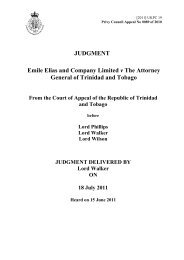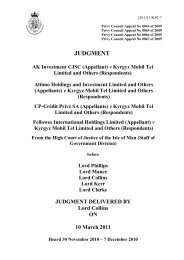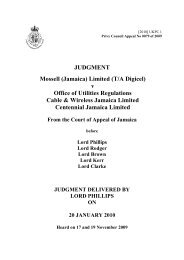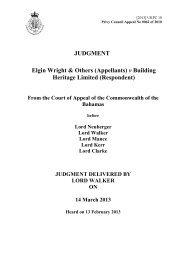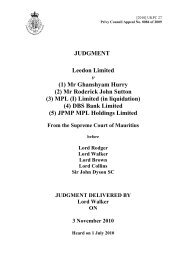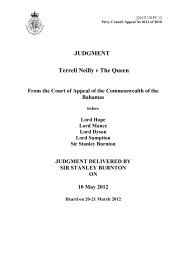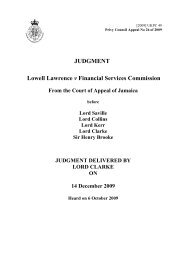Bahamas Hotel Catering & Allied Workers Union - Judicial ...
Bahamas Hotel Catering & Allied Workers Union - Judicial ...
Bahamas Hotel Catering & Allied Workers Union - Judicial ...
Create successful ePaper yourself
Turn your PDF publications into a flip-book with our unique Google optimized e-Paper software.
“In the result I would allow the appeals of Sandals and <strong>Catering</strong>,<br />
extend the time for the filing [of] their application for judicial<br />
review to 6 November 2006. I therefore grant a declaration that<br />
the purported registration of Maintenance was void and of no<br />
effect from its inception because of the failure of the Registrar to<br />
publish notice of its application in the Gazette and to give<br />
<strong>Catering</strong> an opportunity to object. It necessarily follows from<br />
that declaration, that the purported registration of Maintenance is<br />
quashed and that any action taken subsequent to the purported<br />
registration is also void because such action would have been<br />
based on the invalid registration of Maintenance.”<br />
32. The dissenting judgment of Longley JA was, in the Board’s view, very<br />
largely correct in its analysis of the issues. The Board do not summarise his<br />
judgment as a whole, but (as noted below) many of his conclusions are the<br />
same as those reached by the Board.<br />
Section 12 of the 1970 Act<br />
33. Section 12 of the 1970 Act provided that a certificate of registration of a<br />
trade union issued by the Registrar “unless the registration of the union is<br />
proved to have been cancelled and subject to the provisions of section 13, shall<br />
be conclusive evidence that the provisions of this Act and of any regulations<br />
made thereunder with respect to registration have been complied with” (section<br />
13 is concerned with what might be called non-registration). Provisions such<br />
as section 12 are often included in legislation relating to official registers,<br />
because such registers cannot serve their purpose unless members of the public<br />
can safely rely on them. This object would be defeated if a certificate could be<br />
challenged years later, as was attempted in this case. In R v Registrar of<br />
Companies Ex p Central Bank of India [1986] QB 1114 the English Court of<br />
Appeal concluded after very full argument (which occupied nine days) in<br />
relation to a similar provision in the United Kingdom Companies Act 1948 that<br />
the conclusiveness of registration applied to a challenge by way of judicial<br />
review, as well as to other forms of challenge.<br />
34. The correct course, as Longley JA perceived, would have been for<br />
<strong>Catering</strong> to request the Registrar to exercise his powers under section 15 of the<br />
1970 Act to give notice to cancel Maintenance’s registration, since its<br />
registration under such a similar name was made (and so “obtained” by<br />
Maintenance) by mistake. Had the Registrar refused, <strong>Catering</strong> could have<br />
challenged that refusal by way of judicial review, without any problem of delay<br />
(and without Maintenance’s existence as a union since 2001 being brought into<br />
question). The Board express no view as to whether such an application would<br />
Page 11


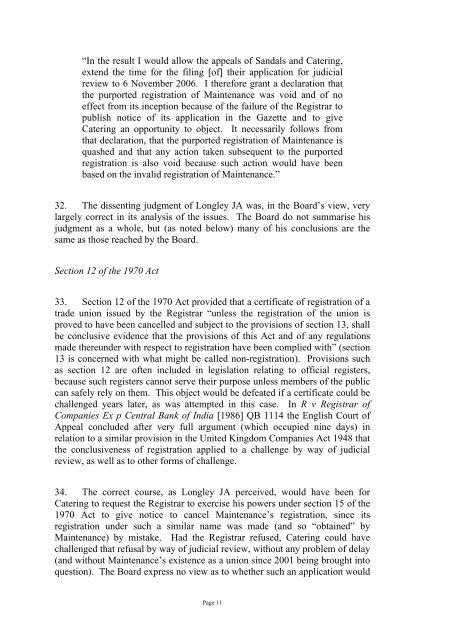
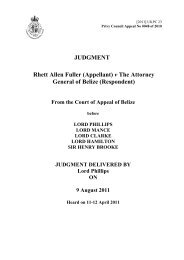
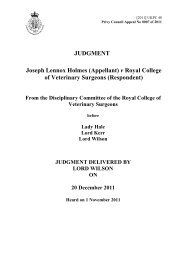
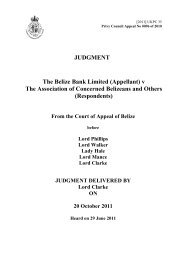
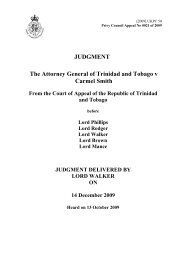
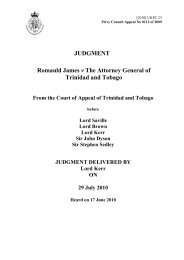
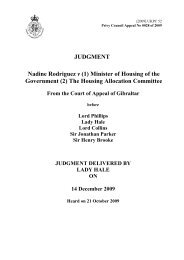
![[2011] UKPC 10 - Judicial Committee of the Privy Council](https://img.yumpu.com/23644185/1/184x260/2011-ukpc-10-judicial-committee-of-the-privy-council.jpg?quality=85)
